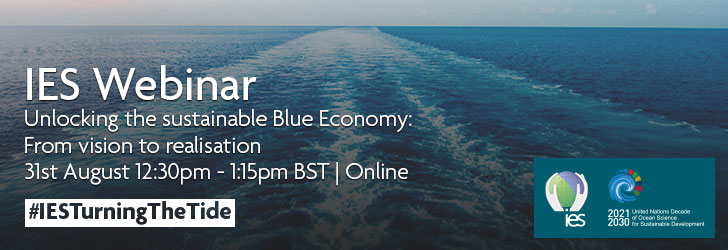The world’s ocean and seas are of great importance, both in terms of the immense source of resources they contain, and for their role in addressing global challenges such as climate change, food security and biodiversity decline. The term Blue Economy covers all economic activities related to oceans, seas and coasts.
In this webinar we will hear from Professor Colin Moffat who will share details of the Scottish Government's Blue Economy approach for the management of the marine environment. Colin will also be discussing The OSPAR Convention's recent commitment to accounting for natural capital and ecosystem services, and the need to consider these concepts along with the blue economy as part of planning and development.
A Q&A session with the audience will follow the speaker presentation:
- Valuing the seas – it really is fundamental!
Professor Colin Moffat, Visiting Professor at Robert Gordon University and Honorary Professor at Heriot-Watt University, ScotlandThe ocean covers approximately 70% of the surface of the planet. It supports a huge diversity of life, supplies some of the oxygen we breathe, moves heat around the planet, provides effective drugs for treating some cancers, and has absorbed about 90% of the additional heat radiating back to Earth because of the additional greenhouse gases in the atmosphere. In addition, the potential of marine assets and resources to support the prosperity of people and communities is now recognised by many. This means that there is a balance to be struck across environmental, societal and economic outcomes.
The Scottish Government has a vision that “by 2045 Scotland’s shared stewardship of our marine environment supports ecosystem health, improved livelihoods, economic prosperity, social inclusion and wellbeing”. This vision will see Scotland becoming an ocean literate and aware nation, and create more equal access to the benefits that ocean resources provide. It will also ensure that human activities are managed using an ecosystem-based approach to minimise or where possible, reverse, the negative impacts on marine ecosystems.
Ultimately, this requires a step change in how we operate. Partnerships will be required across disciplines and sectors, and the development of new tools to inform decision making. Key to this is that the benefits to society and to marine and coastal ecosystems will help ensure that the ocean continues to function and provide the services that are essential for life on Earth.
This event has been organised as part of our Turning the Tide: systems thinking for a sustainable ocean project, which has been endorsed as a UN Ocean Decade Activity. Join our dedicated mailing list to stay up to date on future project activities and hear about ways to collaborate.
Our speaker

Professor Colin Moffat
Initially studying chemistry, Colin completed a PhD in heparin biochemistry, including links to tumour angiogenesis, before joining Torry Research Station where he investigated the structure of fish lipids and their nutritional benefits. He subsequently studied organic contaminants in the marine and terrestrial environments, pathological samples, food-producing animals and food products with a specific interest in their biological effects on marine biota.
Colin has specialised in the methodology associated with determining the state of marine ecosystems. He led on the production the OSPAR Intermediate Assessment 2017, an assessment of the North-East Atlantic, and Scotland’s Marine Assessment 2020. Both utilised new indicators and methodologies, providing an assessment of progress towards achieving a clean, healthy and biologically diverse ocean. Colin was also instrumental in laying some of the foundations for the United Nations (UN) Decade of Ocean Science for Sustainable Development (2021 – 2030) and was a member of the Pool of Experts for the UN World Ocean Assessment 2.
Colin continues to study contamination of aquatic systems by microplastics and pharmaceuticals, as well as the impacts of ocean acidification and climate change. Colin is a Trustee of the Scottish Association of Marine Science. He is currently involved in a programme of work assessing the impacts of placing wind turbines in the sea. Colin retired from the post of Chief Scientific Advisor Marine to the Scottish Government in 2021.
This online event is free to attend and open to all.


